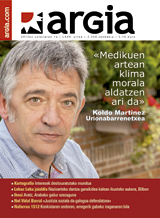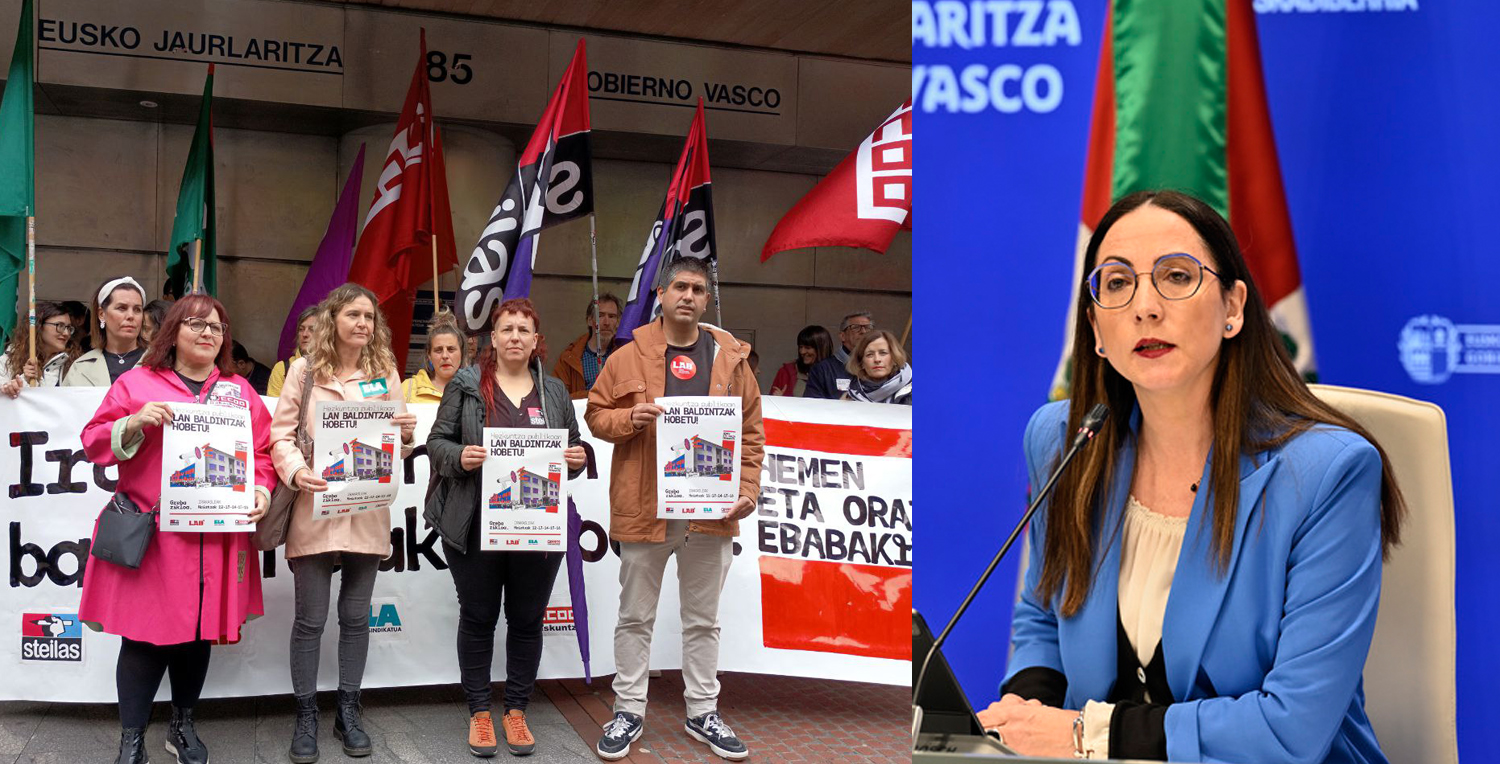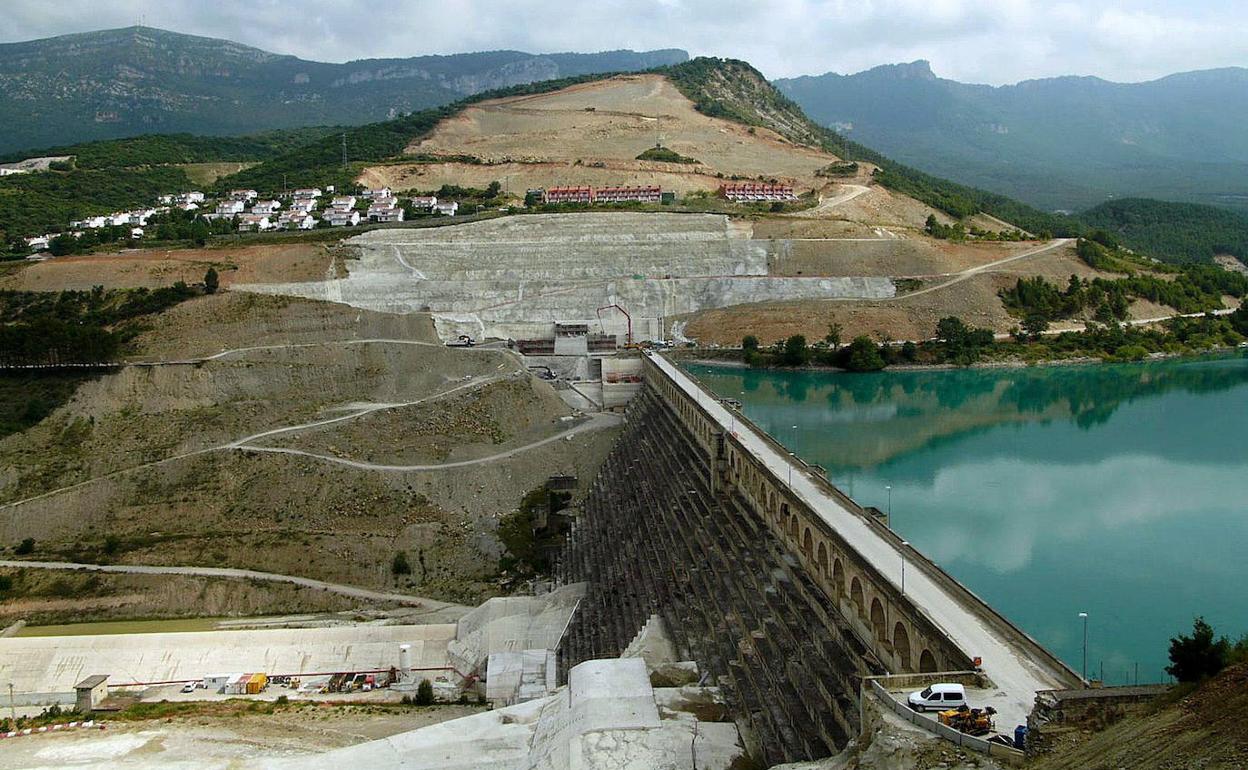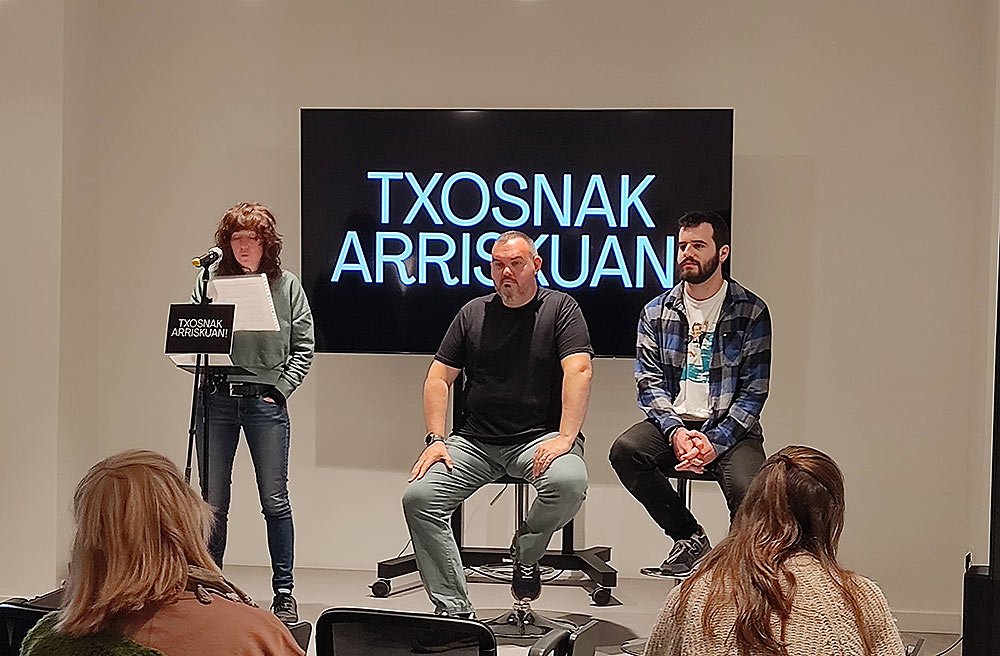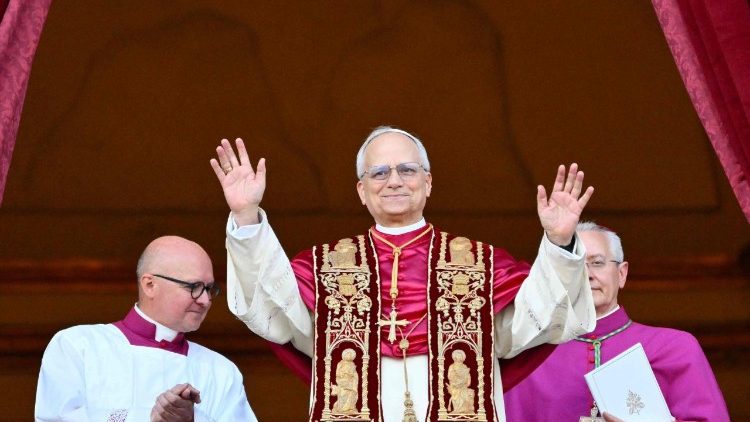"In doctors I saw some concern about legality, but not about ethics"
- Specialist in bioethics and politician.
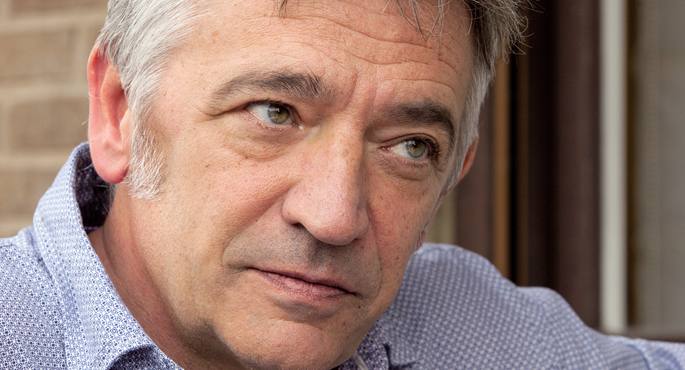
Why did you choose medicine?
At the end of high school, I didn’t really know what I wanted to do: politics, film, philosophy, law, medicine… My father told me not to make movies and my mother wouldn’t enter politics. So, aside from these two questions, I chose medicine, not by vocation, but because it relates many other disciplines: science, philosophy, ethics, politics and cinema in some way, because when you're talking to the patient, you have to guess what you have in your head and what you mean.
Have you always studied in religious centers?
We went to live there as a child at Clérigos College in San Viator, in Arrasate. Then I also made PREU with them in Vitoria and at the University of Opus Dei in Pamplona. Before I got into college, I spent a year in Oregon (USA) studying and living with a family there. When I was offered to go, my mother told me not to hesitate to go to America. It was in 1970. It was a very enriching year. I went back and I entered Opus University. Imagine what change! The first year I did no more than study, but the next, 30 April, two brothers from Pamplona who lived in Zaragoza placed a subversive banner in the central building: “Student workers, united we will win. Long live the first of May.” They were arrested, and the next day we held an assembly saying that if we didn't have to get into politics, neither did the teachers. And that's where my problems started in college. Up to six, I got 12 or 13 dossier notices, but they didn't drop me out, and years later I made the thesis here.
After working in Oñati, in the Chantrea district of Pamplona and in different places, she entered the Intensive Care Unit. Why?
Because it's to be on the front line in the fight against death. I've been working in intensive care for 34 years and I've seen many times the death of others. It's part of life. When they give you life, they give you death. And so it is, fortunately, because if there was no death we would not be here. It has to be acknowledged that it is the last phase of life and that there is nothing else. But all people have ambivalence before death. Sometimes we see the end of a life properly. Like the icing on a cake. What life, what death! Other times, on the other hand, we consider it as a form of liberation. When we all think about our death, we have that doubt: whether it will be the last sentence or liberation. Religions present death as a door, as a way of passing to another life, but I believe death is a wall.
Are we afraid of pain rather than death?
I don't know. Usually, they've gone together, although today we can take physical pain away. It can be easily removed. For religious reasons and for legal fears, many people still die of pain and pain. That cannot be allowed and must be denounced. We live, moreover, in a society that does not accept any pain, but pain and life itself agree. There are some sufferings and pains that have to be removed immediately, but there are others that have to suffer. When the lover abandons you, when your mother or your child dies, takes your home away or kicks you out of work… Hiding these pains goes against us, you need to live and overcome that pain to grow and develop as a person.
What do you think of euthanasia?
In this state, both euthanasia and assisted suicide are out of the law. Today, we can eliminate most of the physical suffering with the resources we have. However, some prefer to end their lives. If certain limits and conditions are clearly set and met, I see no obstacle to legalising both euthanasia and assisted suicide. In Oregon, for example, something very interesting has happened: the defenders of the decriminalisation of euthanasia in all the referendums lost. Then they chose assisted suicide and defeated. So some people said that the ones who would commit suicide the most would be those they would always: poor, women, with a lower level of education, etc. And that hasn't happened. The people who have so far applied are people with university studies, mainly with insurance doctors, as many women as men... The moral reasons that oppose legalization are very scarce.
What is the difference between euthanasia and suicide from a medical point of view?
In euthanasia, the patient asks the doctor to end his life and in assisted suicide what the doctor does is give a prescription for the patient to buy some pills, but then it is left to the patient to take it or not. The second is more comfortable for the doctor.
The moral attitude of the doctor is a delicate issue.
Respect between people forces us to consider the moral reasons of others as moral, if not, there is no respect. However, sometimes things are said that are not true about the moral attitude of doctors. Here in Navarre, for example, in relation to abortion, they said that there were no gynecologists who did abortions, and it is clear that yes, yes, but requirements are required and the administration does not undertake to certify them. That is terrible political manipulation.
You are the first “Spanish” doctor who has completed the European Master of Bioethics.
Yes, in the Diario de Navarra the emphasis was on that “Spanish”. In Medicine, as in any other field, there are two kinds of rules: legal, those that deal with rights and ethics, those that talk about obligations. Among my colleagues, I saw a great deal of concern about legality, but not about the prescriptions of ethics. I wanted to go deeper into it. Added to this curiosity, I started seeing some people I knew and some old friends die of AIDS. It was very important to me. That terrible disease, when I wasn't named yet, I met her when I was 17, when I was in Oregon. In a way, I lived close to the birth of AIDS and I was always very interested in its evolution. In 1990, I spent a year in a hospital in New York doing a study on AIDS and nutrition. It was then that I received the first news regarding my informed consent. Here we had no idea what that was, and hence I became interested in bioethics. I did a two-year master's degree in the Complutense of Madrid and when I finished, she called me the professor to do a European master's degree. I said yes and I spent another two years studying with people from all over the world in Belgium, the Netherlands, Italy and Madrid. I had Diego Gracia as a professor and I think he is the highest level professor in all of Europe. Diego is a wise man, an eminence. I once invited him to come and give a speech, and I presented myself saying that this is the man who has changed my life. He was very flushed and I added: as my mother said, “It was a pity I didn’t know him when you were 18 years old.” He and Jorge Oteiza are the most interesting and wise people I've ever met in my life. One is rationality and the other is passion.
And what have you learned in these masters?
That things are neither white nor black. We all have our reasons, no one is absolutely right or true, and on the contrary, we all have a small part of the truth. The human reason is very weak and poor. I learned a lot about tolerance. I discovered Aristotle and made him company.
How are we in that sense in the health care system here?
We are setting up ethics committees with representatives from all professional areas. It's a very slow, very slow job, and sometimes you think you're not moving forward, but then you see that the moral climate is changing. The improvement has taken place and is taking place. For example, when a high-level doctor approaches you and asks your opinion about your relationship with a patient. That was unthinkable ten years ago. And the relationship between the doctor and the patient is radically changing. The doctor did not give any information to the patient. But this also has its historical reason: Latinos called medicine “muta ars” (mute art). There was nothing to say to the patient. The doctor knew what was good for him and only told him what he had to do and what he didn't. Throughout history, that has been the case until 40 or 30 years ago. Now it is not done well anywhere, either in the Basque Country or in the State. The sick are given a role and it is already there. It is something, but much more needs to be done. In any case, it is not only a matter for doctors to provide information or not. Even some family members sometimes prefer not to tell the whole truth to the patient. And that too needs to be done.
You wanted to take some of those concepts into politics, right?
In politics too, for the evil of all, we have lived things in black and white. Because you're from UPN, you're not always wrong or because you're from Geroa Bai, you're not always right. The reason we are doing so amongst all of us and I believe that we must begin to work on mutual respect and, on that basis, open up ways of seeking consensus.
Are you an independent patriot?
I've always had a passion for politics. I have always seen politics and ethics tied together. I am Abertzale or anti-Abertzale, according to and for what and with whom. When I was 18, I entered the HASI, and then it became HASI. Then a few of us left and organized EKIA. From there I went to the Left Margin of the Basque Country and there I was there for several years, sometimes in agreement and sometimes not. I think that hobby of my independence comes from time to time. When the Basque Left was broken, some went to the Socialist Party, others to the PNV and I went home. At the moment, politics is entirely dependent on the economy. The economy commands in the world and that is why we must fight politically to put the economy in the hands of society. Some say they are disillusioned, but we are all political beings, some enter and some prefer to leave them in the hands of others. That too is politics.
Are you a supporter of independence?
I didn't care at all. With the economic situation we have, with social inequalities, the concern for independence does not seem to me to be a priority. Before that, there are a thousand things: national construction, for example. How to make a Navarre for all Navarros, how to make a Basque country for all Basques, how to make a Europe for all Europeans. Some self-proclaimed nationalists have done enormous damage to the Basque Country. What is being on the left? Is the Socialist Party, for example, left-wing? Is the Abertzale Left left? Until recently did I agree with the violence and that is to be left-wing? Is the PNV right-wing? I move away from those catalogues. Catalogs are the limits we've set to feel safe. For example, homosexual and heterosexual. How many heterosexuals have I found in my bed! What's the difference between men and women? Where is it? They are totally artificial limits and the same is true of nationalism or progressism. Is it progressive to be against or in favour of the APR? Is being in UGT or in ALS on the right? I like to talk about the reasons behind the facts and if we agree on those reasons, if we reach an agreement, go ahead.
Are you the new “Basque people” of Campion?
We created the association because we thought it was necessary to promote the Basque culture and the Basque culture, which emerged in Navarre and looking at Navarre. We saw that the attitude of the Navarre authorities is grievous by the hatred of the Basque Country, but on the other hand, the culture of feism is widespread among those who work for the Basque country. We wanted to do something different and, interestingly, but a week after we went to the authorities we opened the first case against the City Council of Pamplona.
There are still too many maximalisms on the part of both the UPN and the Basque world.
Koldo Martinez Urionabarrenetxea (Eskoriatza, 1953ko otsailaren 25a). Zainketa Intentsiboen Unitateko medikua da Nafarroako Ospitale-gunean. Horrez gain Espainiako Funtsezko eta Kliniko Alorreko Bioetika Elkarteko presidentea da; politikagintzan, Geroa Bai koalizioan, Zabaltzen independenteen taldeko burua; eta Euskara Kultur Elkargoko presidentea ere bada. Hiru aldiz presidentea, beraz. Abertzale eta kosmopolita, Oteizaren lagun eta bere pasioaren mireslea, etikaren banderaria.
“Ez dut parte aktiborik hartu homosexualitatearen inguruko aldarrikapen mugimenduetan. Nire homosexualitatea modu naturalean bizi dut. Armairutik ateratzea batzuei asko kostatzen zaie eta lortzen dutenean konturatzen dira ingurukoentzat ez dela sorpresa bat. Egia da, bestalde, behin ateraz gero, zure bizitza osoan ibili behar duzula armairutik ateratzen”.
BRN + Neighborhood and Sain Mountain + Odei + Monsieur le crepe and Muxker
What: The harvest party.
When: May 2nd.
In which: In the Bilborock Room.
---------------------------------------------------------
The seeds sown need water, light and time to germinate. Nature has... [+]









